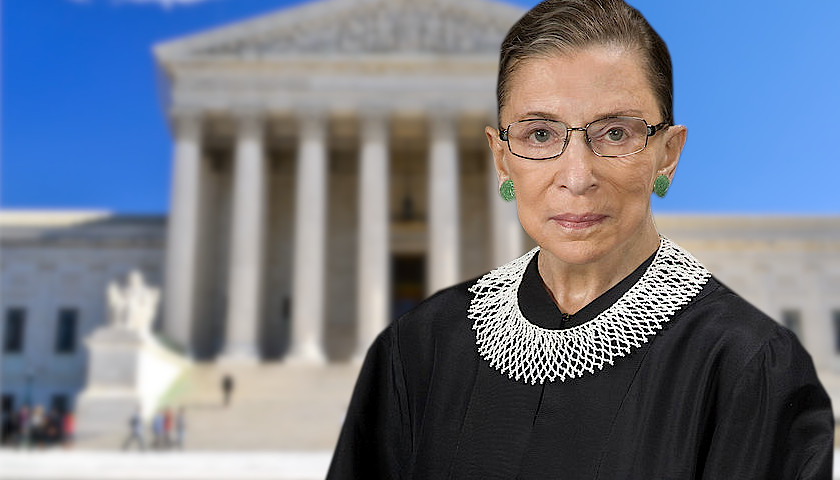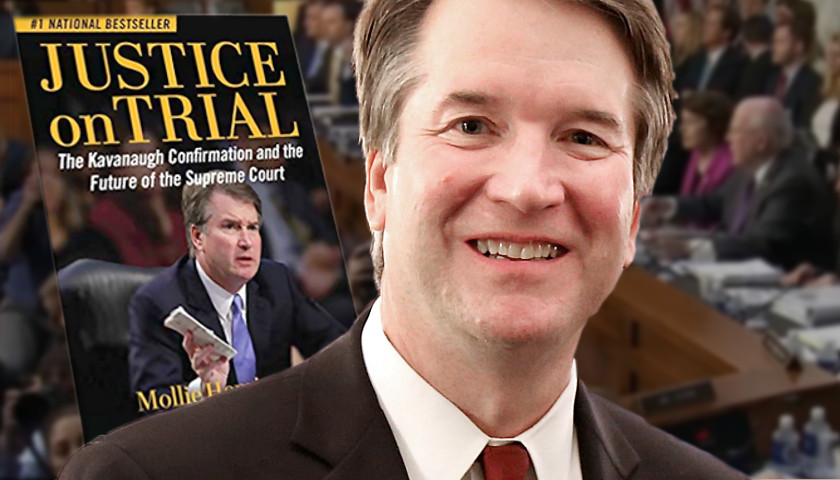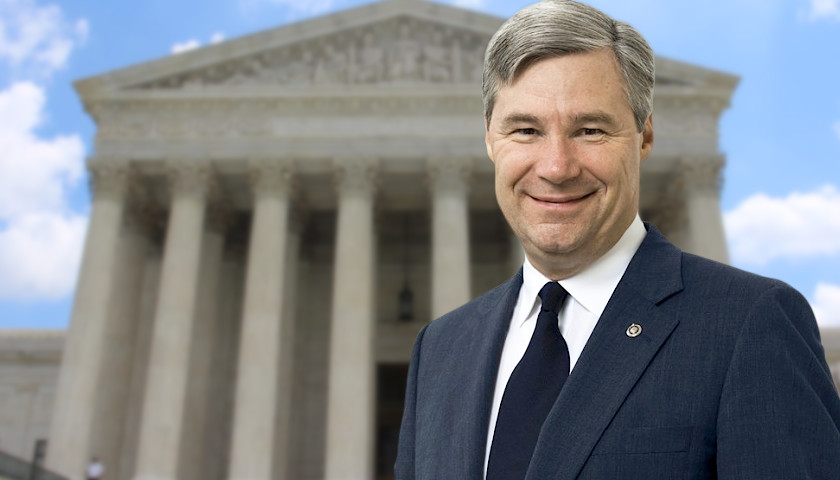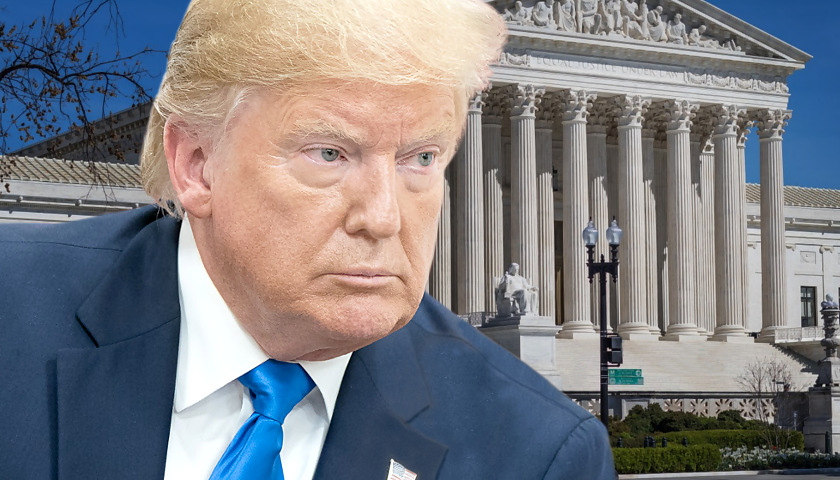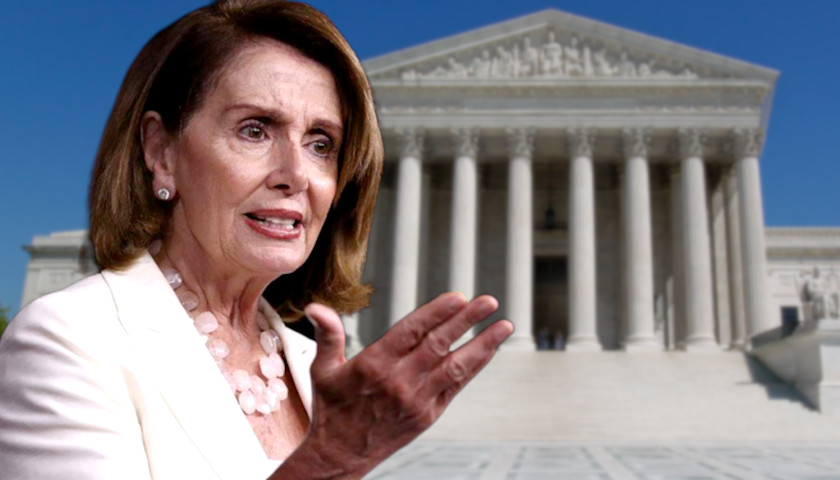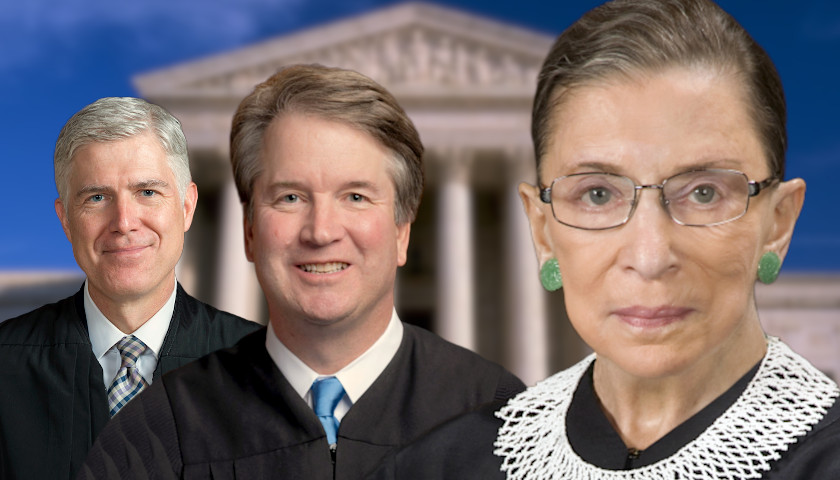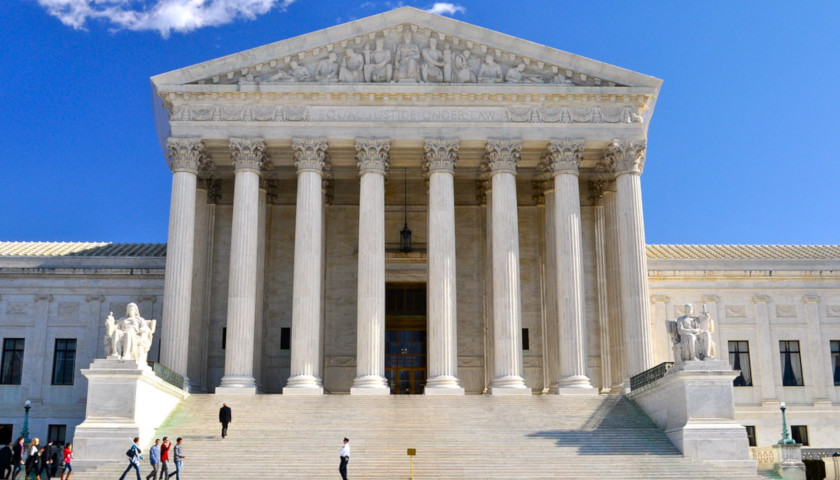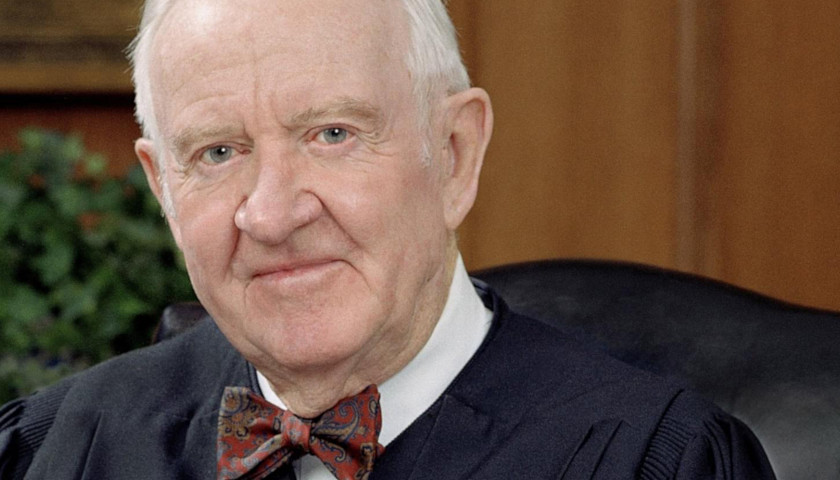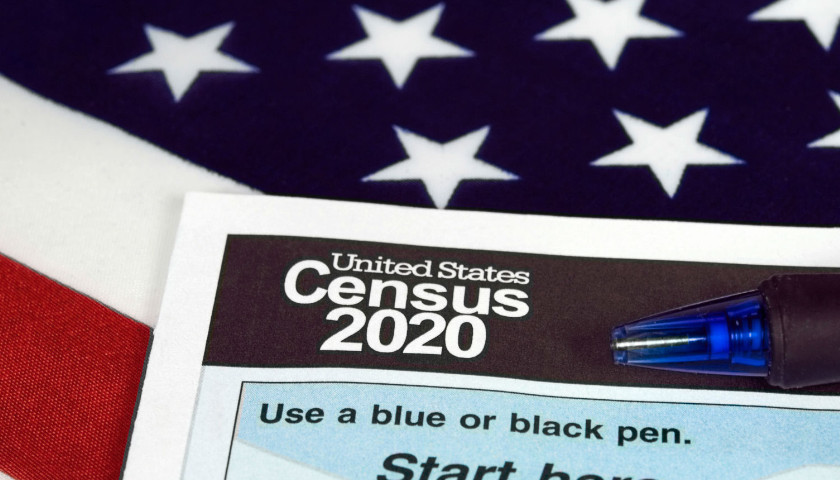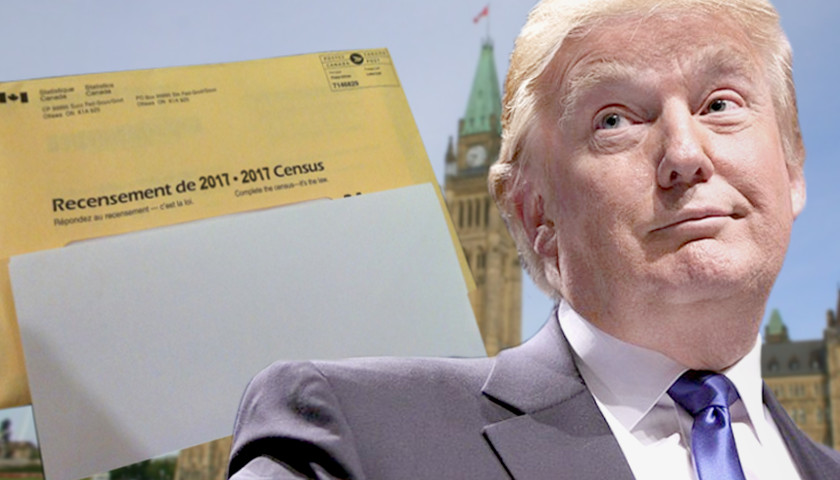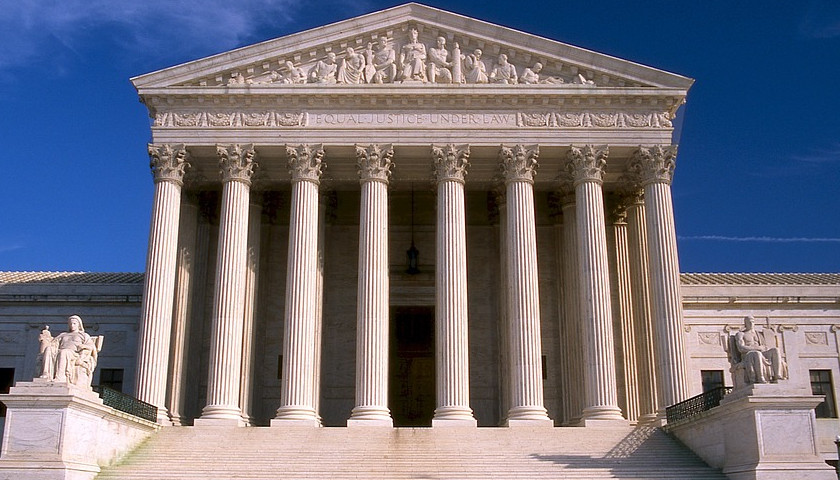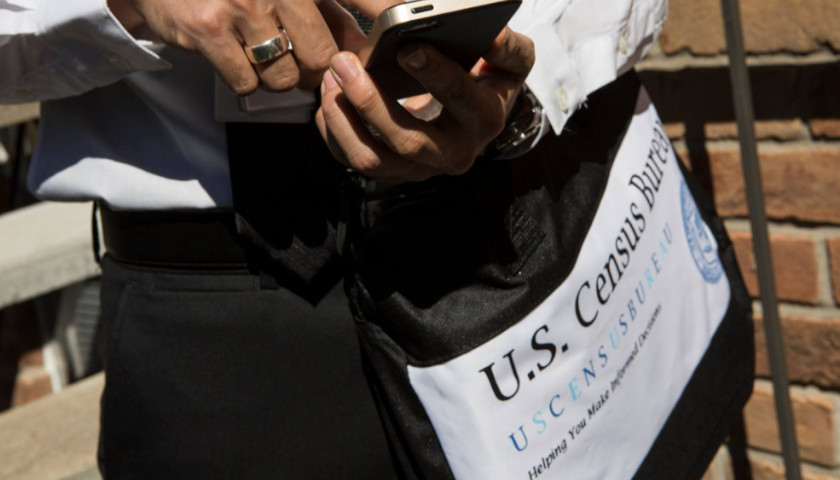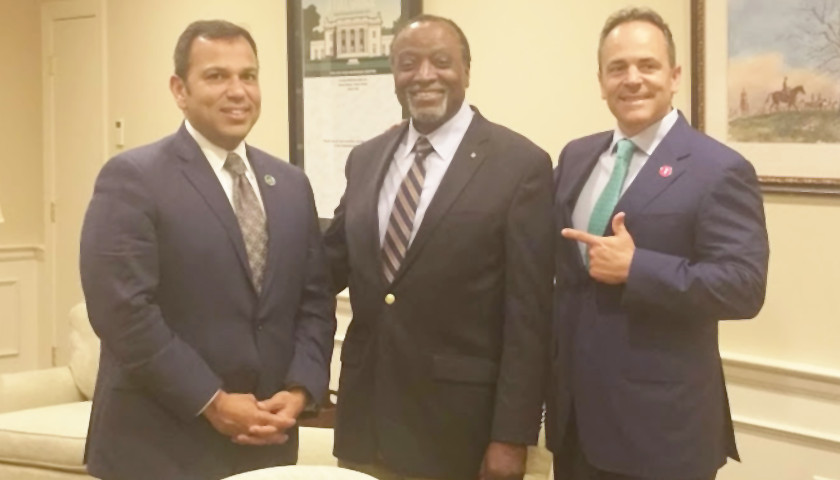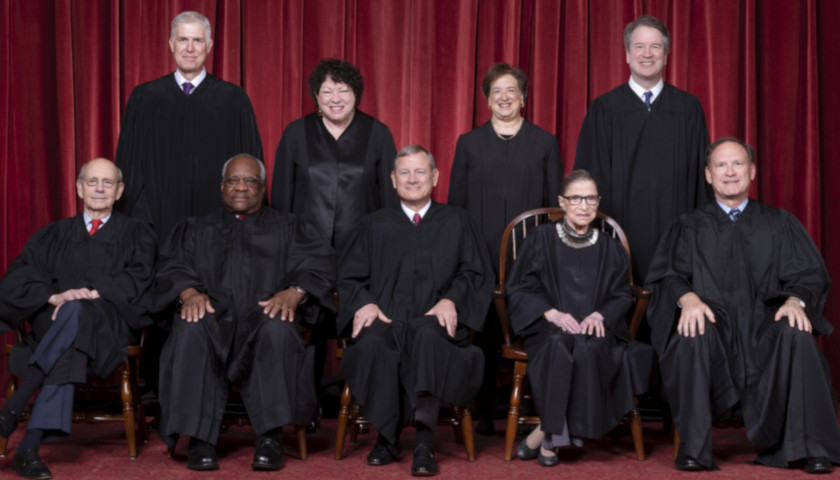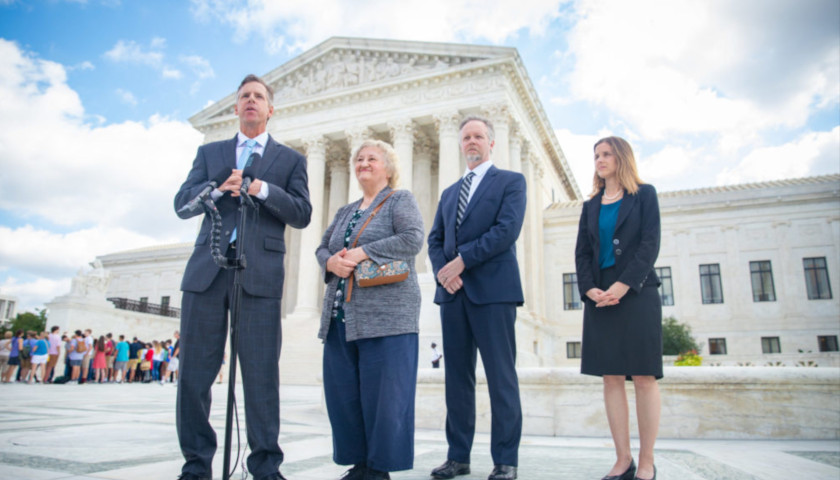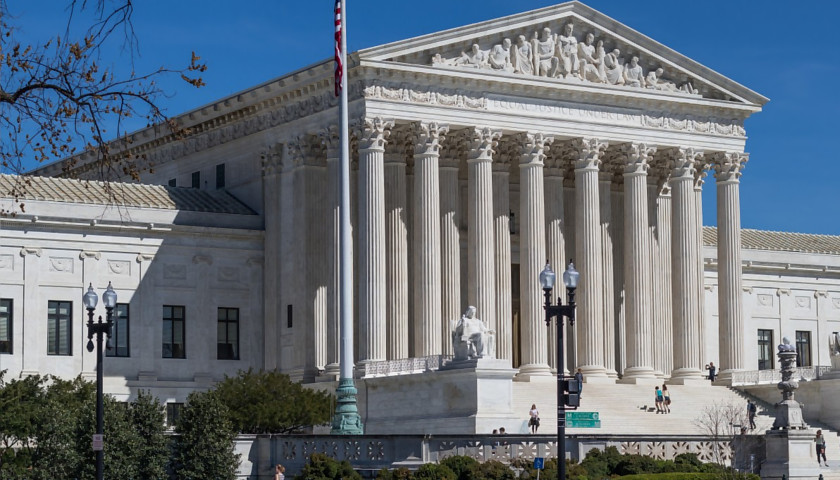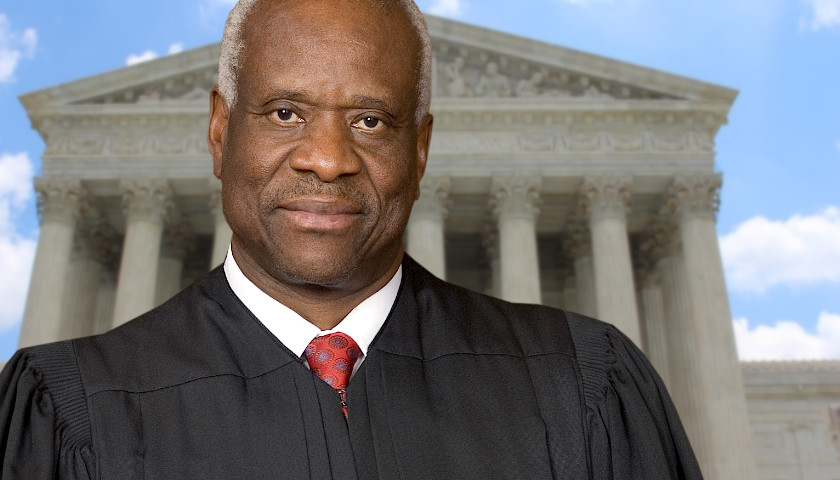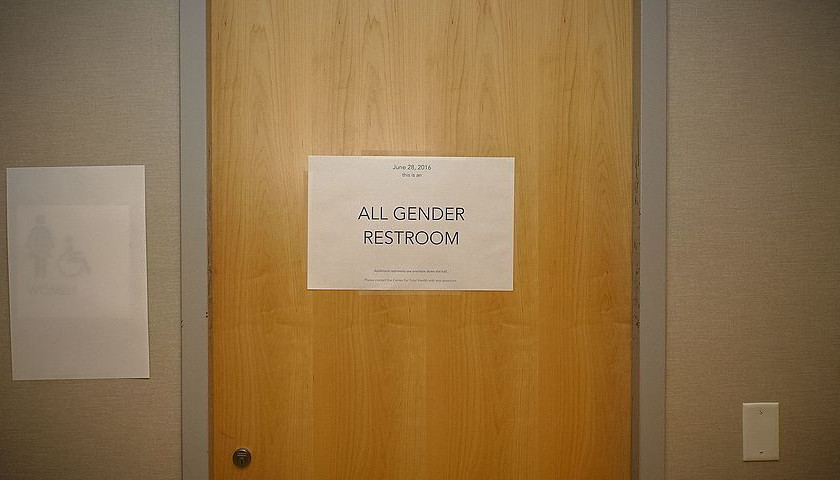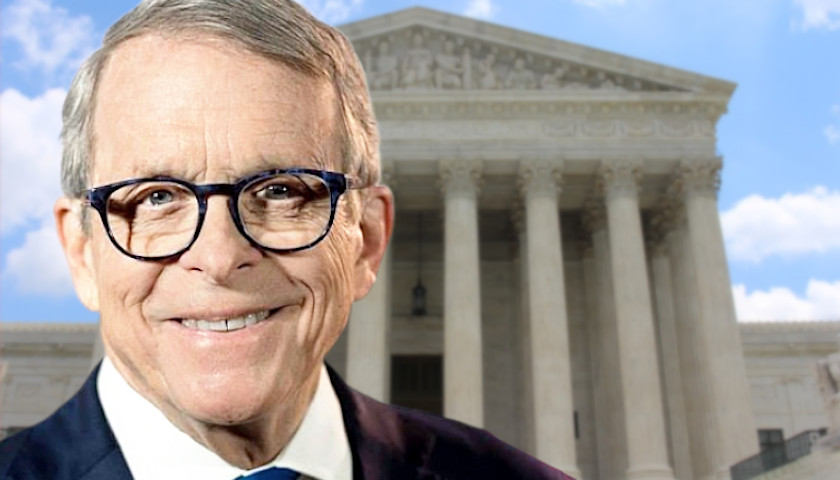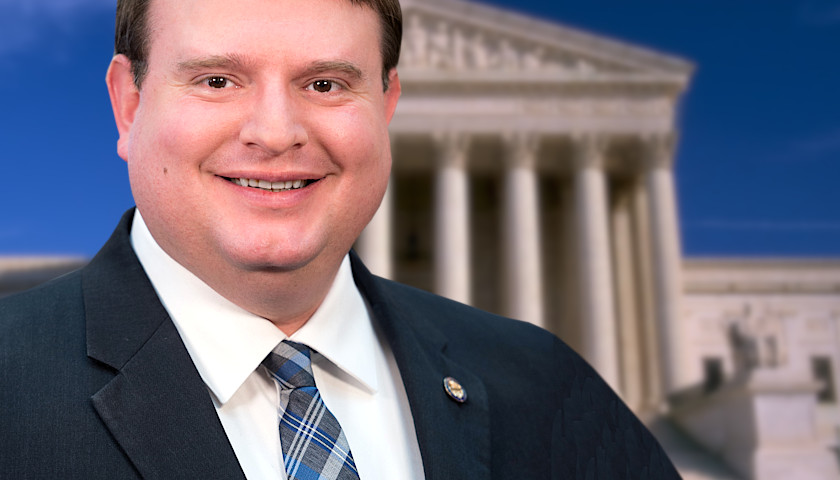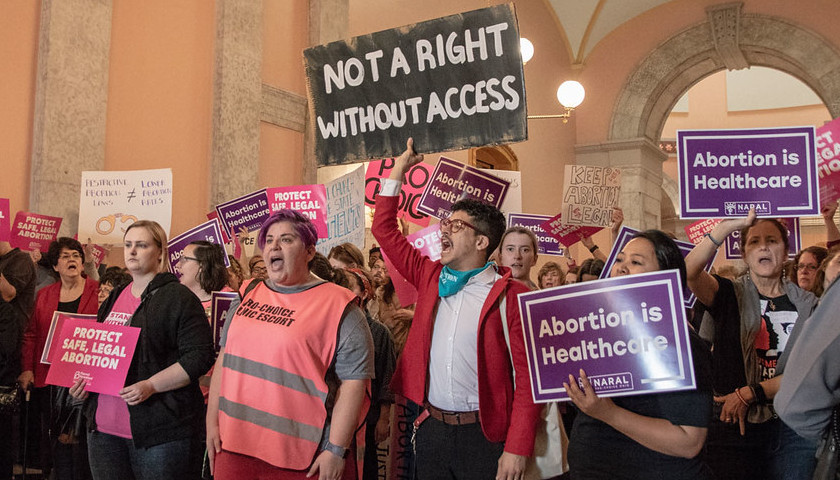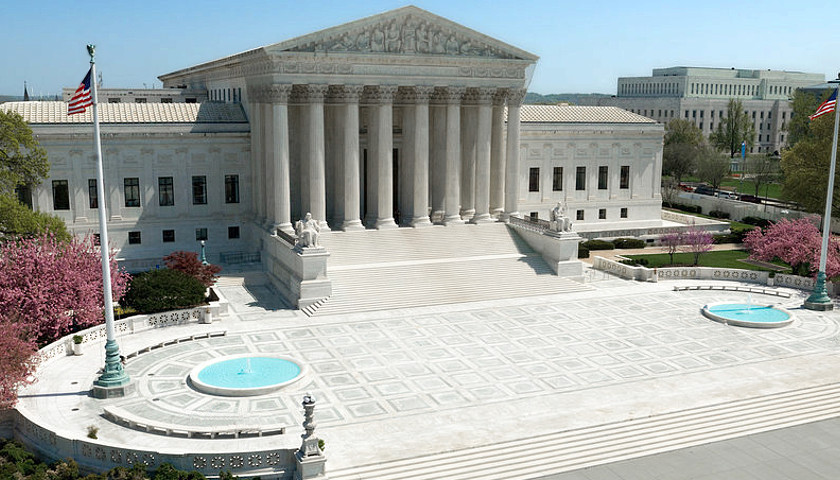Supreme Court Justice Ruth Bader Ginsberg has completed another course of treatment for a malignant tumor doctors found on her pancreas.
Read the full storyTag: Supreme Court
REVIEW: New Book Exposes Who and How Brett Kavanaugh Was Defamed
The Left’s crusade to destroy Supreme Court Justice Brett Kavanaugh isn’t over yet. Last week, House Judiciary Committee Chairman Jerrold Nadler (D-N.Y.) sent a letter to the National Archives to demand the release of any records related to Kavanaugh’s tenure in the George W. Bush White House from 2001 to 2006.
Read the full storyA Pro-Gun Ruling Will Inflame Court-Packing Push, Dem Senator Warns Supreme Court
Democratic Sen. Sheldon Whitehouse of Rhode Island filed a legal brief before the Supreme Court in a challenge to New York City’s gun transportation regulations, advancing a broad indictment of the Roberts Court itself as he urged the justices to turn away the NRA-backed case.
Read the full storyCommentary: The Courts Would be Wise to Stay Out of Political Battles
The nine philosopher-kings enthroned on the Supreme Court were finally gracious enough to let President Trump proceed with his plans to build a wall at the southern border, at least for now. In a 5-4 ruling, the court last month overturned an appellate court’s decision, allowing the Trump Administration to tap into military funds and continue construction while litigation is pending.
Read the full storyCommentary: Democrats Try to Stop Wall Funding They Voted for in 2018 After Recent Supreme Court Decision
Brick by brick, figuratively speaking, with a serious assist from the Supreme Court ruling that reprogramming $2.5 billion of counter-narcotics monies may be used, Donald Trump is fulfilling his promise to get the southern border wall built.
Read the full storyDHS Chief McAleenan Praises Supreme Court Decision: ‘Big Victory’ for Border Wall
Acting Homeland Security Secretary Kevin McAleenan lauded the Supreme Court decision allowing the administration to use military funds to build additional border wall.
Read the full storyPelosi Accuses Supreme Court of Allowing Trump to ‘Steal Military Funds’ to Build Border Wall
House Speaker Nancy Pelosi (D-CA-12) accused the Supreme Court of allowing President Donald Trump to “steal military funds” to build the wall and called the court a “monarchy.”
Read the full storySupreme Court Allows Trump to Build 100 Miles of Wall With Military Funds
The Supreme Court allowed President Donald Trump to reprogram $2.5 billion in Pentagon funds to start construction on 100 miles of border wall in a late Friday order.
Read the full storyJustice Ginsburg Shields Neil Gorsuch, Brett Kavanaugh from Criticism
Justice Ruth Bader Ginsburg defended President Donald Trump’s two appointees to the Supreme Court and rebuffed progressive proposals to expand the tribunal this week.
Read the full storyThe Supreme Court Might Overturn One of Justice Stevens’s Landmark Decisions
by Kevin Daley Late Justice John Paul Stevens left a far-reaching legal legacy in his 34 years on the Supreme Court, writing landmark decisions on presidential powers, property rights and the death penalty. Yet the endurance of his legacy might be an open question. The Supreme Court signaled weeks before Stevens died Tuesday it might overturn one of his most significant opinions, a 1984 decision called Chevron v. National Resources Defense Council. The Chevron case initially seemed like an arcane agency issue of little consequence. In the sweep of time, however, it became one of the most important precedents governing the power of federal agencies. Chevron provides that the courts should defer to an agency’s interpretation of an ambiguous law it administers, provided that interpretation is reasonable. For example, under Chevron, the courts should defer to the Environmental Protection Agency’s reading of an unclear provision in the Clear Air Act. Supporters of Chevron say it ensures complex regulatory questions will be resolved by subject matter experts, instead of layman judges who are ill-equipped to parse complicated areas like pharmaceutical certification. They frame the approach as one of judicial humility and a recognition of the modest role courts should play…
Read the full storyFormer Supreme Court Justice John Paul Stevens Has Died
by Kyle Daley Retired Supreme Court Justice John Paul Stevens, the Republican corporate lawyer who became the leader of the Court’s liberal wing, died Tuesday night in Ft. Lauderdale, Florida. He was 99. The Supreme Court’s public information office said Stevens died from complications of a stroke suffered earlier in the day. “A son of the midwest heartland and a veteran of World War II, Justice Stevens devoted his long life to public service, including 35 years on the Supreme Court,” Chief Justice John Roberts said in a statement. “He brought to our bench an inimitable blend of kindness, humility, wisdom and independence. His unrelenting commitment to justice has left us a better nation.” “We extend our deepest condolences to his children Elizabeth and Susan, and to his extended family. Steven’s 35 year tenure is the third longest in the Court’s history. When he retired in 2010 at age 90, he was the second oldest justice ever to sit on the high court. – – – Kyle Daley is a reporter for the Daily Caller News Foundation. Content created by The Daily Caller News Foundation is available without charge to any eligible news publisher…
Read the full storyThe Border Wall Fight Just Got to the Supreme Court
by Kevin Daley The Trump administration asked the Supreme Court for clearance to begin constructing 100 miles of fencing through drug-smuggling corridors along the U.S.-Mexico border. The Friday request comes after U.S. District Judge Haywood Gilliam forbade the administration from using $2.5 billion in military funds for border wall construction. The 9th U.S. Circuit Court of Appeals denied the administration’s request to stay that ruling while litigation continued on July 3. “The practical significance of the decision below for the government’s drug-interdiction efforts would weigh strongly in favor of further review,” the government’s stay application to the high court reads. “The decision prevents the Department of Defense from taking steps to support the Department of Homeland Security that the acting secretary of defense determined to be ‘necessary in the national interest’ to stanch the flow of illegal drugs across the southern border,” it adds. The trial court’s injunctions stalled border barrier construction projects in Arizona and New Mexico. The projects are high priorities for DHS given the volume of drug trafficking in those areas, according to government lawyers. President Donald Trump declared a national emergency at the southern border on Feb. 15. Following the declaration, the Pentagon reprogrammed the…
Read the full storyCommentary: Put the Citizenship Question on the Census
by CHQ Staff After a Supreme Court majority led by Chief Justice Roberts flubbed the ruling on the Democrats’ lawfare attack on including the citizenship question on the census Attorney General William Barr said Monday he sees a way to legally require 2020 census respondents to declare whether or not they are citizens. In an interview with the Associated Press, Barr said the Trump administration will take action in the coming days that he believes will allow the government to add the controversial census query. Barr would not detail the plans, though a senior official said President Donald Trump is expected to issue a memorandum to the Commerce Department instructing it to include the question on census forms. To that end the Justice Department is replacing the legal team that has been pursuing Trump’s efforts, putting in place a new team consisting of both career and politically appointed attorneys. The new team, named in court papers, includes Deputy Assistant Attorney General David Morrell, a former Trump White House lawyer and law clerk to Justice Clarence Thomas; Christopher Bates, who previously worked for Republican Sen. Orrin Hatch of Utah, and four career Justice Department attorneys, Glenn Girdharry, Colin Kisor, Christopher…
Read the full storyCitizenship Question Has Been Included on Canada’s Census Since 1901
The debate over whether or not to include a citizenship question on the 2020 U.S. census has become the latest division in American politics, but a similar question has been included on Canada’s census for more than a century. On Saturday, the Canadian Broadcasting Corporation (CBC) reported that America’s neighbor to the north has included a citizenship question on its census since 1901. CBC notes that Canada’s long-form census asks: “Of what country is this person a citizen?” Respondents can select three possible answers, including: “Canada, by birth,” “Canada, by naturalization,” or “Other country – specify.” “The citizenship question has a long history on the Canadian census, being introduced for the first time on the 1901 census,” Emily Theelen, a spokeswoman for Statistics Canada, told CBC. “This information is used to estimate the number of potential voters and to plan citizenship classes and programs,” Theelen added. “It also provides information about the population with multiple citizenships and the number of immigrants in Canada who hold Canadian citizenship.” Canada conducts its census every five years, while the U.S. census occurs every 10 years. Immigration lawyer Lorne Waldman said there’s no evidence that census information has been abused for immigration-enforcement purposes…
Read the full storyTrump Will Push for Census Citizenship Question
by Kevin Daley One day after senior officials publicly abandoned their ambitions to add a citizenship question to the 2020 census form, the Trump administration abruptly reversed course and told a federal judge it would continue its legal fight. Though government lawyers and census officials said the question would be excluded, President Donald Trump said by tweet Wednesday morning that his administration would press the issue. “We at the Department of Justice have been instructed to examine whether there is a path forward, consistent with the Supreme Court’s decision, that would allow us to include the citizenship question on the census,” assistant Attorney General Jody Hunt told a federal judge in Maryland. Government lawyers seemed bewildered when the Maryland judge asked them about the government’s rapidly evolving position. “The tweet this morning was the first I had heard of the president’s position on this issue, just like the plaintiffs and your honor,” said government lawyer Josh Gardner. “I do not have a deeper understanding of what that means at this juncture other than what the president has tweeted. But, obviously, as you can imagine, I am doing my absolute best to figure out what’s going on.” “What I told…
Read the full storyIt’s Not Donald Trump’s Supreme Court Yet
by Kevin Daley This piece is the first of a series reviewing the Supreme Court’s 2018-2019 term. The justices adjourned for the summer on June 27. Though President Donald Trump’s two appointments have set a new trajectory for the Supreme Court, the conservative majority flashed a strong independent streak in its 2018-2019 term. As the administration leveraged bold procedural maneuvers and a law-and-order agenda, the justices resisted a “Trumpification” of the judiciary, while leaving the administration reason for optimism. Aggressive procedural tactics The newly-completed term was marked by the government’s liberal use of a seldom-used procedure to bypass lower courts like the 9th U.S. Circuit Court of Appeals. The solicitor general (SG), who represents the government before the Supreme Court, filed petitions for review before judgment in several politically-charged matters — meaning the government wanted the justices to take a case before an appeals panel had a chance to weigh in. Petitions for review before judgment (formally “certiorari before judgment”) are not granted absent extraordinary circumstances. Past examples include U.S. v. Nixon, regarding release of the so-called Watergate tape, and the 1952 Youngstown Sheet case over President Harry Truman’s bid to nationalize the steel industry. The Court granted only…
Read the full storySCOTUS to Hear Montana Case on School Choice, Religious Liberty
by Derek Draplin The U.S. Supreme Court will hear a wide-reaching Montana case dealing with school choice and the First Amendment. The Supreme Court announced Friday that it will take up the case Espinoza v. Montana Department of Revenue, which is being litigated by the Institute for Justice, a libertarian public interest law firm. The case stems from a scholarship program passed in 2015 by the Montana legislature that would give tax credits to those who donated to private scholarship organizations, which would then give scholarships to students in need who wanted to attend private schools. The program allowed for scholarships to be used at private religious schools. The Montana Department of Revenue, however, determined that the program violated the state constitution’s “Blaine Amendment” because it allowed for scholarships to be used at religious schools. The Montana Supreme Court backed the Department of Revenue’s argument and later invalidated the scholarship program, leading to the lawsuit. The Institute for Justice is representing several parents including Kendra Espinoza, a single mother who enrolled her kids in a private Christian school after public school wasn’t a good fit. Lower courts have been split on similar questions over school choice in the past,…
Read the full storyTrump Administration Backs Off Census Citizenship Question After Supreme Court Defeat
by Kevin Daley The Trump administration will not include a citizenship question on the 2020 census form, the Justice Department said Tuesday. The decision comes after the Supreme Court found Commerce Secretary Wilbur Ross concealed his reasons for adding the citizenship question and cleared the way for further proceedings. The Commerce Department supervises the Census Bureau. “The decision has been made to print the 2020 Decennial Census questionnaire without a citizenship question,” a Justice Department lawyer wrote in an email shared on Twitter. “The printer has been instructed to begin the printing process.” A Department spokesperson confirmed the government’s plans to the Daily Caller News Foundation. The case proceeded through the federal courts on an expedited basis due to time constraints. Government lawyers said the Census Bureau needed to finalize the questionnaire by July 1 to ensure timely printing and distribution. The Supreme Court agreed to hear the case in an accelerated procedural posture given the press of time. However, some census officials suggested the government could delay printing until October, raising the prospect that the government could ultimately add the citizenship question if it prevailed in another round of litigation. President Donald Trump suggested he would delay the…
Read the full storyDr. Alan Keyes and Kentucky Governor Matt Bevin Meet to Discuss Their Shared Pro-Life Agenda
FRANKFORT, Kentucky – Dr. Alan Keyes, a man of numerous political distinctions, met with Kentucky Governor Matt Bevin at the governor’s mansion in Frankfort, Kentucky, where their shared pro-life agenda dominated the discussion. Dr. Keyes, who holds a Ph.D. in government from Harvard and wrote his dissertation on constitutional theory, ran for president in 1996, 2000 and 2008 and challenged Barack Obama for the open U.S. Senate seat from Illinois in 2004, according to RenewAmerica. Serving as Assistant Secretary of State for International Organizations and as Ambassador to the United Nations Economic and Social Council, Dr. Keyes was the highest-ranking black appointee in the Reagan Administration. In fact, following their initial, very warm greeting, Dr. Keyes stayed to speak with Bevin and his brother, and the Governor called Dr. Keyes “Ambassador” as they sat at a table in a cozy den-type room in the lower level of the Kentucky Governor’s mansion. Governor Bevin and his staff wear a quarter-sized red lapel pin with an open pair of scissors, representing the updating or elimination of 27 percent of Kentucky government’s regulations and reducing the boards and commissions that numbered 572 down to 375 over a period of two years. Bevin,…
Read the full storyCommentary: Why Doesn’t the Supreme Court Want to Know How Many Illegal Aliens America Has?
by Robert Romano The Supreme Court unanimously ruled that a citizenship question can be included in a Census under the U.S. Constitution, however a narrower 5 to 4 majority threw out the specific rationale used by the Trump administration for the 2020 Census, remanding the case to lower courts for adjudication. Chief Justice John Roberts, joining the higher court’s liberal justices, stated “We do not hold that the agency decision here was substantively invalid. But agencies must pursue their goals reasonably. Reasoned decisionmaking under the Administrative Procedures Act calls for an explanation for agency action. What was provided here was more of a distraction.” This is the so-called reasoned analysis that is supposed to accompany a regulation under Supreme Court precedent. The Department said it relied on the Department of Justice saying the information was needed to enforce the Voting Rights Act. In this case, however, the court ruled that the Department of Commerce “adopted the Voting Rights Act rationale late in the process” and the “evidence established that the Secretary had made up his mind to reinstate a citizenship question ‘well before’ receiving DOJ’s request, and did so for reasons unknown but unrelated to the VRA.” The court…
Read the full storyThe Supreme Court Will Determine the DACA Program’s Future Next Term
by Kevin Daley The Supreme Court will decide whether President Donald Trump can rescind the Deferred Action for Childhood Arrivals (DACA) program during its next term, the justices announced Friday. DACA is an Obama-era amnesty initiative that extends temporary legal status to 700,000 foreign nationals who came to the U.S. as children. The Department of Homeland Security first took steps to terminate DACA in September 2017. Federal trial judges subsequently entered injunctions requiring that Trump maintain the program while litigation continued. The first of those orders came from U.S. District Judge William Alsup in California, who said the government’s action was based on a flawed legal premise and therefore “arbitrary, capricious, an abuse of discretion, [and] otherwise not in accordance with law.” That premise — that only Congress, not the executive, could authorize a program like DACA — conflicts with precedent and the Department of Justice’s past-stated views, Alsup said. Shortly after those injunctions issued, the Trump administration took the unusual step of bypassing the federal appeals courts and asking the Supreme Court to intervene immediately. The high court rejected that request, prompting a new round of litigation in the appellate courts. The government returned to the Supreme Court…
Read the full storySupreme Court Justice Roberts Joins Open-Border Liberals to Block the Census Citizenship Question, For Now
by Kevin Daley The Supreme Court ordered further proceedings in the dispute over a citizenship question on the 2020 census form Thursday, saying the Trump administration apparently concealed its true reason for adding the query. Chief Justice John Roberts delivered the Court’s opinion, portions of which were unanimous. “It is rare to review a record as extensive as the one before us when evaluating informal agency action — and it should be,” Roberts wrote. “But having done so for the sufficient reasons we have explained, we cannot ignore the disconnect between the decision made and the explanation given. Our review is deferential, but we are “not required to exhibit a naiveté from which ordinary citizens are free.” The Department of Commerce, which supervises the Census Bureau, must now identify a more developed explanation for the citizenship question, and present it to the courts for approval. A coalition of advocacy groups including the American Civil Liberties Union (ACLU) joined left-leaning state and city governments to sue the administration after Commerce Secretary Wilbur Ross ordered the Census Bureau to include the citizenship question. The plaintiffs fear such questions discourage minority participation. Since seats in Congress and federal funds are apportioned on…
Read the full storySupreme Court Rules Judges Can’t Block Partisan Gerrymandering
by Tyler Arnold A narrowly divided Supreme Court ruled Thursday that federal judges have no authority to block politically gerrymandered maps. The 5-4 decision fell along ideological lines with the five conservative judges signing onto the decision and the liberal judges dissenting. “We conclude that partisan gerrymandering claims present political questions beyond the reach of the federal courts,” Chief Justice John Roberts said in his opinion. “Federal judges have no license to reallocate political power between the two major political parties, with no plausible grant of authority in the Constitution, and no legal standards to limit and direct their decisions.” Roberts said that the court has been asked to overturn politically gerrymandered lines for the past 45 years, but that it has never done so. If the court made decisions on whether maps were gerrymandered to favor a specific party, he said that judicial reviews would recur with every new round of redistricting. “That intervention would be unlimited in scope and duration,” Roberts said. He said it would be “an unprecedented expansion of judicial power.” Roberts emphasized that the Court is not condoning politically gerrymandered maps, but that the issue can be resolved by state courts enforcing state laws…
Read the full storySupreme Court Strikes Down Tennessee Liquor Law
The Supreme Court ruled against a Tennessee law that requires people to live in the state for two years before acquiring a retail license to sell alcohol. The court’s 7-2 decision ruled that Tennessee’s law had violated the Constitution’s Commerce Clause, which gives Congress the power “to regulate Commerce with foreign Nations, and among the several States.” “Because Tennessee’s two-year residency requirement for retail license applicants blatantly favors the state residents and has little relationship to public health and safety, it is unconstitutional,” conservative Justice Samuel Alito wrote in the majority opinion. The case (Tennessee Wine and Spirits Retailers Assn. V. Russell F. Thomas, Executive Director of Tennessee Alchohol Beverage Commission, Et Al.) gave the Supreme Court a chance to define the 21st Amendment’s scope, which allows states to regulate alcohol sales within state lines. Previously, the court ruled against Michigan and New York laws prohibiting out-of-state based wine companies from shipping wine within their states. In the Granholm v. Heald case, a 5-4 decision decided these state laws also violated the Commerce Clause. “While this requirement is less extreme than the others that the Sixth Circuit found to be unconstitutional, we now hold that it also violates the Commerce Clause…
Read the full storyPennsylvania Farmer Wins Supreme Court Case That Finds Federal Property Rights are Equal to Other Constitutional Rights
The U.S. Supreme Court on Friday ruled in favor of a Pennsylvania farm owner who said the government effectively took her property without paying for it. Rose Knick won the victory in the case of Knick v. Township of Scott. In making its ruling, SCOTUS overturned a 1985 precedent, Williamson County Regional Planning Commission v. Hamilton Bank of Johnson City. The Supreme Court’s opinion is here. Knick was represented by Pacific Legal Foundation, which argued for SCOTUS to overturn the 1985 ruling that allowed federal courts to refuse to hear her challenge to a local ordinance that forced her to allow public access to her private farmland, according to a press release by PLF. PLF said in a story that Knick’s ordeal began in 2013, when government agents forced her to allow public access to a suspected gravesite on her farmland. She sued over the unconstitutional taking. A federal court refused to hear her federal claim, citing the 1985 decision. Hamilton Bank of Johnson City, Tennessee owned of a tract of land in Williamson County and intended to develop it into a residential subdivision, according to a case summary by Oyez. The Williamson County Regional Planning Commission denied the…
Read the full storySupreme Court Throws Out Case Where Prosecutors Illegally Excluded African American Jurors
by Kevin Daley The Supreme Court tossed out capital defendant Curtis Flowers’s death sentence Friday, finding that prosecutors unlawfully rigged his jury by excluding African Americans. Justice Brett Kavanaugh delivered the opinion for a seven-justice majority, which said the prosecution violated the 1986 Batson v. Kentucky decision. Batson provides that peremptory strikes — which allow lawyers to boot prospective jurors for any reason at all — cannot be used to exclude people based on race. “The state’s relentless, determined effort to rid the jury of black individuals strongly suggests that the state wanted to try Flowers before a jury with as few black jurors as possible, and ideally before an all-white jury,” Kavanaugh wrote. “The trial judge was aware of the history. But the judge did not sufficiently account for the history when considering Flowers’ Batson claim.” “In the Dark,” an American Public Media podcast, produced an award-winning series on the Flowers case. A white prosecutor, Doug Evans, has tried Flowers six times in the Mississippi courts for a 1996 quadruple homicide. Two of those cases resulted in a mistrial due to deadlocked juries. Flowers was found guilty in the other three, but appeals courts lifted those convictions because…
Read the full storyPeace Cross Honoring War Dead Can Stay, High Court Rules
by Fred Lucas The Supreme Court ruled 7-2 Thursday that a cross-shaped war memorial on public land in Maryland doesn’t violate the Constitution. In the case of American Legion v. the American Humanist Association, the atheist group had sued seeking removal of the 40-foot Peace Cross in Prince George’s County–just outside Washington, D.C.–contending that the World War I memorial was contrary to the separation of church and state. However, a supermajority on a court that is often closely divided on hot button issues determined the history of the Peace Cross erected in Bladensburg, Maryland, doesn’t indicate it promoted a religion, Christianity, in honoring 49 local men who died in the war. “For nearly a century, the Bladensburg Cross has expressed the community’s grief at the loss of the young men who perished, its thanks for their sacrifice, and its dedication to the ideals for which they fought,” Justice Samuel Alito wrote in the majority opinion for the court. Alito went on to quote Justice Stephen Breyer’s words from a previous case also hinging on the Constitution’s Establishment Clause. “It has become a prominent community landmark, and its removal or radical alteration at this date would be seen by many…
Read the full storyChallengers to Citizenship Question Ask Supreme Court to Delay Census Ruling
by Kevin Daley Civil rights groups urged the Supreme Court to postpone its decision on the census citizenship question case late Wednesday, asking the justices to return the dispute to a lower court for review of new evidence. The plaintiffs said in late May that they uncovered evidence showing the Trump administration hopes to use granular citizenship data from the census to help Republicans during the redistricting process. That evidence, as well as claims that senior administration officials made false statements in official proceedings, needs to be reviewed by a trial court, the plaintiffs say. “If ever there were a case that should be decided on the basis of a true and complete record, it is this one,” the plaintiffs wrote in a Wednesday filing with the high court. “The decennial census is one of the U.S. government’s most important constitutional responsibilities, and even an appearance that the government has manipulated the census for partisan and racially discriminatory purposes would undermine public confidence in our representative democracy.” “This Court should not bless the [government’s] decision on this tainted record, under a shadow that the truth will later come to light,” the filing adds. Such suggestions are highly unusual at…
Read the full storyCleveland Agrees to $225,000 Settlement With Communist Who Believes ‘America Was Never Great’
Cleveland has agreed to pay $225,000 in a settlement with a second protester who was arrested outside of the 2016 Republican National Convention for burning the American flag. As The Ohio Star reported in April, the city agreed to a $50,000 settlement with Steven Fridley, who was also arrested for partaking in the protest. This time the money is going to Gregory “Joey” Johnson, the same Gregory Johnson who was the defendant in the U.S. Supreme Court’s 1989 Texas v. Johnson decision. That case found that burning the American flag was protected by the First Amendment. Johnson and Fridley both had their criminal charges dismissed by the Cleveland Municipal Court, and sued the City of Cleveland for violating their First Amendment rights. “Instead of protecting RNC protesters’ constitutional rights, Cleveland police stalked them, literally extinguished their speech rights, and then arrested and prosecuted them—violating 30-year-old Supreme Court precedent taught to schoolchildren,” said Subodh Chandra of Chandra Law Firm, which represented both Johnson and Fridley. Chandra criticized city leaders for failing to “hold officers accountable for lying” about Johnson, whom police officers claimed was on fire and setting others on fire during the protest. Video of the incident, however, contradicts…
Read the full storySupreme Court Turns Down Trump Administration Bid to Accelerate DACA Appeal
by Kevin Daley The Supreme Court rejected a request Monday to expedite its consideration of the Trump administration’s bid to end the Deferred Action for Childhood Arrivals (DACA) program. DACA is an Obama-era amnesty initiative that extends temporary legal status to 700,000 non-citizens who arrived in the U.S. as children. There were no noted dissents from Monday’s decision. As is typical of orders of this nature, the Court did not give reasons for rejecting the government’s request. The Department of Homeland Security first took steps to terminate DACA in September 2017. Federal trial judges subsequently entered injunctions requiring that Trump maintain the program while litigation continued. Beginning in November 2018, the administration challenged three of those injunctions in the Supreme Court. The justices were poised to decide whether to hear those cases in January, but no action came. The Court’s continued inaction on those petitions is perhaps the greatest mystery of the current Supreme Court term. The administration filed a fourth DACA petition at the high court in May, after the 4th U.S. Circuit Court of Appeals upheld one of the injunctions against DACA repeal. This time, the Department of Justice asked the Court to put the petition on the fast track…
Read the full storyCommentary: Justice Clarence Thomas Is the Moral Center of the Supreme Court
by George Rasley Is it possible to construct a lasting and healthy society upon a legal foundation that not only protects but encourages infanticide, a deep and profoundly immoral act? We do not believe it is, and the door opened by Roe v. Wade has led American society into a darkness that can only end in the eugenic and racist nightmare of the Nazi Third Reich and other cultures that have allowed humans to be culled like livestock or killed when they become inconvenient. The battle lines in this great moral debate were set out in stark terms by Justices Clarence Thomas and Ruth Bader Ginsberg in the Supreme Court’s recent holding in Box v. Planned Parenthood of Indiana and Kentucky. As the writers for The Economist explained, Box concerns Indiana’s HEA 1337, which Mike Pence, now the vice-president, signed into law in 2016 when he was governor of the state. In a Seventh Circuit Court of Appeals ruling last year, two of the law’s provisions were deemed unconstitutional: a requirement that fetal remains from abortions be buried or cremated; and a bar on abortions motivated solely by the fetus’s race, sex or diagnosed disability such as Down syndrome.…
Read the full storySupreme Court Declines Review of Transgender Bathroom Case
by Mary Margaret Olohan The United States Supreme Court declined to review a case Tuesday involving a Pennsylvania school district opening up bathrooms to students of the opposite sex without informing students or parents. The Supreme Court declined to take up Doe v. Boyertown Area School District, a lawsuit that alleges that the school violated students’ fundamental right to bodily privacy. The Alliance Defending Freedom and Independence Law Center attorneys who represent the students and their parents asked the Supreme Court to review the case in November after the U.S. Court of Appeals for the 3rd Circuit ruled that the students’ privacy did not merit protection, according to a press release from ADF. The case originated in Boyertown Area School District near Philadelphia when school officials began allowing trans students to use bathrooms and locker rooms corresponding with these students’ stated gender identity. The school officials did not announce the policy change and the policy change has not yet been put into writing. (RELATED: The Supreme Court May Soon Decide On Transgender Bathrooms In Public Schools) The petitioners include students who were dressing in the locker rooms or bathrooms and suddenly realized that a person of the opposite sex…
Read the full storyUS Supreme Court Upholds Indiana Abortion Law on Fetal Remains
The Supreme Court is upholding an Indiana law that requires abortion providers to dispose of aborted fetuses in the same way as human remains. But the justices are staying out of the debate over a broader, blocked provision that would prevent a woman in Indiana from having an abortion based on gender, race or disability. The court split 7-2 in allowing Indiana to enforce the fetal remains measure that had been blocked by a federal appeals court. The justices said in an unsigned opinion that the case does not involve limits on abortion rights. Justices Ruth Bader Ginsburg and Sonia Sotomayor dissented. Ginsburg said in a short opinion that she believes that the issue does implicate a woman’s right to an abortion “without undue interference from the state.” The 7th U.S. Circuit Court of Appeals in Chicago had blocked both provisions of a law signed by Vice President Mike Pence in 2016 when he was Indiana’s governor. The court’s action Tuesday keeps it out of an election-year review of the Indiana law amid a flurry of new state laws that go the very heart of abortion rights. Alabama Gov. Kay Ivey this month signed a law that would ban…
Read the full storySupreme Court Blocks Order Requiring Republicans to Redraw District Lines in Ohio and Michigan
by Kevin Daley The Supreme Court temporarily blocked two decisions Friday requiring Republican-controlled legislatures in Michigan and Ohio to produce new legislative district lines ahead of the 2020 election. There were no noted dissents from the Friday orders. The decision was not surprising, as the justices are currently deciding whether federal courts should even hear partisan gerrymandering disputes. Three-judge panels in both cases said the current district lines are unconstitutionally rigged to the benefit of Republicans. The GOP has strong majorities in the congressional delegations of Michigan and Ohio, though Democrats and Republicans run competitively in both states. Each decision set fast-moving schedules for the state legislatures — the Michigan ruling gave the state until Aug. 1 to draw new lines, while the Ohio decision required a remedial plan by June 14. Friday’s order from the high court means that neither state will have to create new district maps in the short-term. The justices heard arguments in March over Republican gerrymanders in North Carolina and a Democratic one in Maryland. Both cases ask whether and how federal courts can resolve controversies over partisan redistricting. Since the Michigan and Ohio appeals will turn on the outcome of the Maryland and…
Read the full storyJoe Robertson Was Imprisoned for Digging Ponds on His Montana Land, and Now His Widow Continues the Fight
by Kevin Mooney The name of a Navy veteran may be cleared after he was convicted, fined, and imprisoned for digging ponds in a wooded area near his Montana home, to supply water in case of fire. The Supreme Court has vacated a lower court ruling against Joe Robertson, who was sent to federal prison and ordered to pay $130,000 in restitution through deductions from his Social Security checks. Any definitive legal victory for Robertson would be posthumous, since he died March 18 at age 80. But his lawyers describe the Supreme Court’s action as a “big win” for Robertson’s widow, Carrie, who plans to carry on the fight. [ The liberal Left continue to push their radical agenda against American values. The good news is there is a solution. Find out more ] President Barack Obama’s Justice Department had prosecuted Robertson for digging in “navigable waters” without a permit, in violation of the Clean Water Act. The 9th U.S. Circuit Court of Appeals upheld a lower court ruling against Robertson in November 2017 and denied him a rehearing in July 2018. The Navy veteran’s initial trial at the district court level resulted in a hung jury and a mistrial. He then was…
Read the full storyThe Supreme Court Is Deciding These Abortion Cases Right Now
by Kevin Daley Alabama GOP Gov. Kay Ivey approved a package of sweeping abortion regulations Wednesday, teeing up a legal fight over Roe v. Wade some believe may reach the Supreme Court. Whether the Alabama law will even reach the Supreme Court on the merits is an open question, though there are two abortion controversies from Indiana and Louisiana on which the justices may act in the coming months. Mandatory ultrasounds, disposal regulations for fetal remains, and bans on trait-selective abortion Vice President Mike Pence signed a battery of abortion regulations into law during his tenure as governor of Indiana. Those mandates require women to have an ultrasound 18 hours before terminating a pregnancy, compel medical professionals to cremate or bury fetal remains, and ban abortions on the basis of sex, race, or disability. The 7th U.S. Circuit Court of Appeals ruled against all three regulations over two different decisions. The first case touched the disposal mandate and the trait-selective abortion ban, which supporters refer to as an anti-eugenics law. A three-judge panel unanimously struck down the trait-selective ban and found against the disposal rules 2-1. The full 7th Circuit elected to review the panel ruling in June 2018,…
Read the full storyGovernor Mike DeWine Says He Intends to Take Abortion Bill Lawsuit to Supreme Court
by Tyler Arnold The Ohio ACLU filed a lawsuit challenging recently signed legislation that would prohibit abortion after a fetal heartbeat can be detected. Republican Gov. Mike DeWine said he intends to take this fight all the way to the U.S. Supreme Court to challenge the abortion law precedent set by Roe V. Wade. “This is an expected development,” Dan Tierney, a spokesperson for DeWine, told The Center Square in an email. “Gov. DeWine has long said that this issue will ultimately be decided by the United States Supreme Court.” The national ACLU and abortion provider Planned Parenthood filed the joint lawsuit with the Ohio ACLU. The lawsuit claims that the legislation violates the precedent in Roe V. Wade, which ruled that abortion is a Constitutionally protected right required to protect a woman’s right to privacy. “This assault on reproductive rights has been anticipated, and we’ve been preparing and perfecting our case,” Freda Levenson, the legal director for the Ohio ACLU, said in a news release. “‘Total ban’ is not inflammatory rhetoric — this is a ban on almost all abortions, and if the court does not block it, it will imperil the freedoms and health of Ohio women,”…
Read the full storyOhio GOP to Appeal Gerrymandering Ruling to SCOTUS
by Tyler Arnold Ohio Senate Republicans plan to appeal to the U.S. Supreme Court a lower court’s ruling that the state’s district lines are unconstitutionally gerrymandered to favor the GOP. “We look forward to appealing today’s decision, and ultimately, to seeing it reversed by the Supreme Court,” Ohio Senate President Larry Obhof, R-Medina, said in a news release. “Make no mistake, this politically-motivated lawsuit was brought for the sole purpose of helping Democrat candidates win more seats,” Obhof said. “It does so at the expense of Ohio’s voters, who would be forced to vote under three different congressional maps in four calendar years. That is bad public policy and is unfair to the people of Ohio. The U.S. Supreme Court has rejected similar challenges over the past year.” The ruling followed a lawsuit spearheaded by the League of Women Voters with representation from the ACLU. The three-judge panel unanimously decided that the state legislature will be required to create new maps in time for the 2020 elections. Per the judge’s order, Ohio must create new district maps that fix the violations by June 14 and submit the plan to the judges by June 21. These lines will have to…
Read the full storyOhio Custodians Sue Kent State and Union for Illegally Deducting Fees
A group of custodians at Kent State University are suing their employer and its union representatives, who have continued to illegally deduct dues from their paychecks after they resigned their membership. The custodians, Annamarie Hannay, Adda Gape, and John Kohl, are being assisted in their legal challenge by The Buckeye Institute and the Liberty Justice Center, which represented Mark Janus in the landmark U.S. Supreme Court ruling of Janus v. AFSCME. In that case, the Supreme Court ruled that it was unconstitutional for government employers to withhold union dues from employees without their “affirmative consent.” As a result of that ruling, Hannay, Gape, and Kohl resigned their union membership and asked the university to stop deducting dues from their paychecks. The union, which happens to be the American Federation of State, County, and Municipal Employees (AFSCME), said in response that members can only opt-out of union membership “once per year during a 15-day window preceding the anniversary of their signature on a union card,” according to the lawsuit. The plaintiffs allege that AFSCME refused to honor their resignations outside of “arbitrary opt-out periods.” “AFSCME is putting money before workers. The union is violating workers’ constitutional rights by denying their resignations…
Read the full storyDivided Supreme Court Poised to Allow Citizenship Question on 2020 Census
by Kevin Daley A deeply divided Supreme Court appeared ready to allow the Trump administration to include a citizenship question on the 2020 census form during a Tuesday morning argument, which was alternatively technical and heated. The Court’s divide followed the usual ideological lines. Though the case involves several complex questions, ultimately the Court’s conservatives seemed to say that the citizenship question is ordinary and appropriate for the census. “The principal purpose is to count the population, but we’ve had demographic questions on the census,” Chief Justice John Roberts said. “I don’t know how far back, but certainly it’s quite common.” “The questions go quite beyond how many people there are,” Roberts added, noting the census forms include questions touching finances and lifestyles. A coalition of Democratic cities, states, and civil rights groups sued the Trump administration after Commerce Secretary Wilbur Ross, who supervises the Census Bureau, authorized the inclusion of the citizenship question on the 2020 census form. The plaintiffs, citing the Census Bureau’s own findings, say the question will diminish non-citizen participation. As such, the plaintiffs warn that the government’s move strikes at the very heart of democracy, since population is used to apportion federal funds, seats…
Read the full storyThe Financial State of Unions After Janus
by Brittany Hunter The Supreme Court made history last summer in the case of Janus v. American Federation of State, County and Municipal Employees (AFSCME) reaffirmed an individual’s First Amendment right to freedom of association. In a 5-4 ruling, SCOTUS ruled that labor unions could not force government employees to pay union dues. In the aftermath of Janus, labor unions have been holding their breath waiting to see how this landmark case would impact both their funding and their membership. Now, nearly a year later, reports filed with the US Department of Labor show that two giant public sector unions are reporting major decreases in agency payers, demonstrating just how significant a blow the ruling was to unions. The news should be celebrated as a victory over union intimidation; truly good ideas, after all, do not require force. However, despite the tremendous strides that have been made over the last year, the battle for the right to work has not been won quite yet. Janus and Agency Fees Prior to the Janus case, the courts ruled that government employees could not be forced to join labor unions. They could, however, be forced to pay union agency fees. A fundamental…
Read the full storyFederal Judge Blocks Part of Ohio Law Banning Second Trimester Abortion Procedure
A Federal Judge has ruled that portions of an abortion-limiting bill, signed into law late last year, cannot be enforced as the law is written. As previously reported: On December 13, 2018, then-Governor John Kasich signed Senate Bill 145 (SB 145), commonly referred to as a Dismemberment Abortion Ban into law. It is, as reported at the time, “an act that restricts one of the most common methods in which second-trimester abortions are performed. The Dismemberment Abortion Ban, as the bill is known, restricts doctors from performing procedures in which dismemberment of the fetus occurs. The law also made it a “fourth-degree felony” for a doctor to perform the procedure. Should a doctor do so, they could face up to 18 months in prison and the loss of their license to practice medicine. The procedure can only be performed if the mother’s life is at serious risk or if the doctor causes “fetal demise” before the procedure. In late March, Senior U.S. District Judge Michael Barrett in Cincinnati placed a temporary hold on the bill. This was placed as the result of a lawsuit filed by Planned Parenthood against the bill on the grounds that the law was unconstitutional. “They…
Read the full storyUnions Have Lost Hundreds of Thousands of Members Since SCOTUS Decision on Forced Dues
by Tim Pearce Three of the largest public sector unions in the United States have lost hundreds of thousands of members and agency fee payers since the Supreme Court banned forced dues last year, according to data reviewed by the Mackinac Center. The U.S. Supreme Court ruled on June 27, 2018, in the case Janus v. American Federation of State, County and Municipal Employees ruled that forcing an employee to pay dues to a union in order to hold a government job violates that employee’s First Amendment rights. The court ruling freed millions of public employees from having to pay union dues and fees in order to hold a job working for the government. Federal filings reviewed by the Mackinac Center suggest that public sector unions have taken a significant hit from losing members and fee payers since the decision. Annual federal filings show that the National Education Association (NEA); American Federation of State, County and Municipal Employees (AFSCME); and Service Employees International Union (SEIU) have lost a combined 278,804 members and fee payers from each organization’s last report before the Janus decision to the first report after it. The NEA’s membership and fee-payer count dropped from 2,666,339 on…
Read the full storyTwo Key Cases the Supreme Court Will Hear in April
by Elizabeth Slattery Conversations about the Supreme Court this spring have been dominated by discussion of conspiracy theories about Justice Ruth Bader Ginsburg’s health, Democratic presidential hopefuls’ plans to “pack the Supreme Court,” and a manufactured “controversy” over Justice Brett Kavanaugh teaching at George Mason University’s Scalia Law School. But on Monday, the justices begin their final argument sitting of the term, with 13 oral arguments scheduled over the next two weeks. Here are two cases to watch this month. 1. Whether the Term ‘FUCT’ Can Be Trademarked In Iancu v. Brunetti, the justices will look at whether a federal law called the Lanham Act that prohibits registration of “immoral” or “scandalous” trademarks by the U.S. Patent and Trademark Office violates the First Amendment. [ The liberal Left continue to push their radical agenda against American values. The good news is there is a solution. Find out more ] If this sounds familiar, that’s because the Supreme Court heard a similar case, Matal v. Tam, challenging the same law’s prohibition on “offensive” trademarks in 2017. The justices unanimously ruled for the challengers, an Asian-American band called the Slants, with Justice Samuel Alito declaring that the ban on “offensive” trademarks “offend[ed] a bedrock First Amendment principle: Speech may not…
Read the full storyDeWine Officially Signs Heartbeat Bill as National Groups Prepare for Legal Battle
Gov. Mike DeWine signed Ohio’s heartbeat bill into law Thursday afternoon, and advocacy groups and legal teams nationwide are all preparing for what is sure to be a major political and legal battle. For the third time in the last decade, a bill that would ban all abortions after a fetal heartbeat can be detected officially made its way to the Ohio governor’s desk. Senate Bill 23 (SB 23) would ban any abortion once a fetal heartbeat can be detected. Though this varies based on available medical technology, it is generally agreed to be around the six to the nine-week mark. Hence, many consider it a six-week abortion limit. “The essential function of government is to protect the most vulnerable among us, those who don’t have a voice,” DeWine said while signing the bill. “Government’s role should be to protect life from beginning to end.” Past versions of the bill were both vetoed by former Gov. John Kasich, who stated that he agreed with it in principle but felt that “the state of Ohio will be the losing party in that lawsuit and…will be forced to pay hundreds of thousands of taxpayer dollars to cover the legal fees for the pro-choice activists’ lawyers.” This time,…
Read the full storyOhio Senator Sherrod Brown Blasts Trump on Obamacare Repeal, Calls on Governor and Attorney General to ‘Do More’
Monday, Ohio Democratic Senator Sherrod Brown and Columbus City Attorney Zach Klein, in a joint press conference at PrimaryOne Health in Ohio, pledged to oppose President Trump’s recent efforts to repeal the Affordable Care Act (ACA), nicknamed “Obamacare.” As previously reported, the court case Texas v. Azar ruled that the ACA was unconstitutional. The Supreme Court had previously ruled that the Individual Mandate component of the law was “unconstitutional under the Interstate Commerce Clause, but could fairly be read as an exercise of Congress’ Tax Power,” but upheld the bulk of the law. From this, Texas Federal District Court Judge Reed O’Connor ruled that because the mandate was unconstitutional, the ACA is, by default, unconstitutional. For several months, the ruling has sat pending with the U.S. Fifth Circuit Court of Appeals. In late March, the Department of Justice, at the behest of President Trump sent a letter to the court, stating that they agreed with the Fifth Circuit Court’s ruling and, “Because the United States is not urging that any portion of the district court’s judgment be reversed, the government intends to file a brief on the appellees’ schedule.” Should the court affirm this ruling, the ACA could be overturned within the year. On August…
Read the full storySupreme Court Rebuffs Gun Rights Groups in Fight Against Bump Stock Ban
by Kevin Daley The Supreme Court rejected another last-ditch bid to stop the Trump administration’s bump stock ban, denying a gun rights coalition a temporary exemption from the new regulation early Friday afternoon. Friday’s order was the third application relating to the bump stock ban that the Supreme Court has rejected in recent weeks. The plaintiffs in Friday’s case were five individuals and three gun rights organizations, including the Firearms Policy Foundation, the Madison Society Foundation, and Florida Carry. They sought a temporary reprieve from the ban for themselves and their members. “Absent a stay, applicants and their members will be required to surrender or destroy their property or face felony charges for possession of devices that were unquestionably legal under ATF’s construction of the statute for the past 85 years and ATF’s prior written rulings stating as much,” their petition reads. Neither the vote count nor the Court’s reasoning was disclosed, as is typical of orders of this nature, though Justices Clarence Thomas and Neil Gorsuch noted their dissent. Bump stocks are an accessory that increases a semiautomatic rifle’s rate of fire. The Department of Justice says the appendage effectively turns a semiautomatic weapon into a machine gun,…
Read the full storyOhio Attorney General Opposes Scrapping All of Obamacare, Breaking With President Trump
Ohio Republican Attorney General Dave Yost announced Wednesday he would oppose President Donald Trump’s plan to completely repeal the Affordable Care Act (ACA), better known as Obamacare. On December 14, 2018, shortly before the 2019 open enrollment period ended, a contentious and controversial case was finally ruled on by the U.S. Supreme Court. Texas v. Azar challenged that the entire Affordable Care Act was unconstitutional. The case noted that the Supreme Court previously ruled “the Individual Mandate was unconstitutional under the Interstate Commerce Clause but could fairly be read as an exercise of Congress’ Tax Power because it triggered a tax.” However, the Tax Cuts and Jobs Act “eliminated that tax,” and “thus compels the conclusion that the Individual Mandate may no longer be upheld under the Tax Power.” “And because the Individual Mandate continues to mandate the purchase of health insurance, it remains unsustainable under the Interstate Commerce Clause—as the Supreme Court already held,” the case added. Based on this, Texas Federal District Court Judge Reed O’Connor made three conclusions: First, the Court finds the Parties satisfy the applicable standing requirements. Second, the Court finds the Individual Mandate can no longer be fairly read as an exercise of Congress’s Tax Power and is…
Read the full storySupreme Court Hears Gerrymandering Case That Could Extensively Redraw the Ohio Electoral Map
The United States Supreme Court began hearing oral arguments Tuesday on a pair of cases that could lead to the Ohio electoral map being completely redrawn. The two cases, Rucho v. Common Cause and Lamone v. Benisekm, could both set precedents that could supersede a similar Ohio case making its way to the Supreme Court. On August 5, 2016, Common Cause, the North Carolina Democratic Party, and a group of voters filed a complaint against Robert A. Rucho “in his official capacity as Chairman of the North Carolina Senate Redistricting Committee,” and several other key members who presided over the drawing of the 2016 North Carolina congressional map. The complaint alleged that the map is an: unconstitutional partisan gerrymander that violates the First Amendment (Count I), the Equal Protection Clause of the Fourteenth Amendment (Count II), and Article I, section 2 of the Constitution of the United States (Count III), and also to declare that in adopting the 2016 Plan the legislature exceeded the authority granted by Article I, section 4 of the U.S. Constitution, which provides that state legislatures “determine the times, places and manner of election” of members of the U.S. House of Representatives (Count IV). They also alleged that Democratic votes…
Read the full storyColumbus Civil Servant Sues Union Over Forced Payments
A city employee of Columbus, Ohio has filed a class action lawsuit against her local labor union for forcing her to pay union fees, despite the practice being ruled unconstitutional. Janus v. American Federation of State, County, and Municipal Employees (AFSCME) was one of the most impactful Supreme Court rulings in recent history. As reported: The landmark court case Janus V. AFSCME, ruled on last year, made it illegal for unions to compel non-union employees to pay “agency fees,” overturning a 1977 decision that affirmed this right. The decision, despite being met with resounding condemnation by national unions, was celebrated by many workers. In addition, Janus ruled that a union can’t deduct any fee from a public employee without their “affirmative consent.” Shortly after this ruling, Columbus city employee Connie Pennington, a dues-paying member of Communication Workers of America (CW) Local 4502, her formerly mandated union representation, decided that she would not continue her involvement with the organization. She resigned her union membership and revoked the forms authorizing her union to deduct their dues from her paycheck. According to a press release provided by her legal defense: …CWA union officials refused to honor her revocation, instead claiming that she could only stop union dues payments at the…
Read the full story
